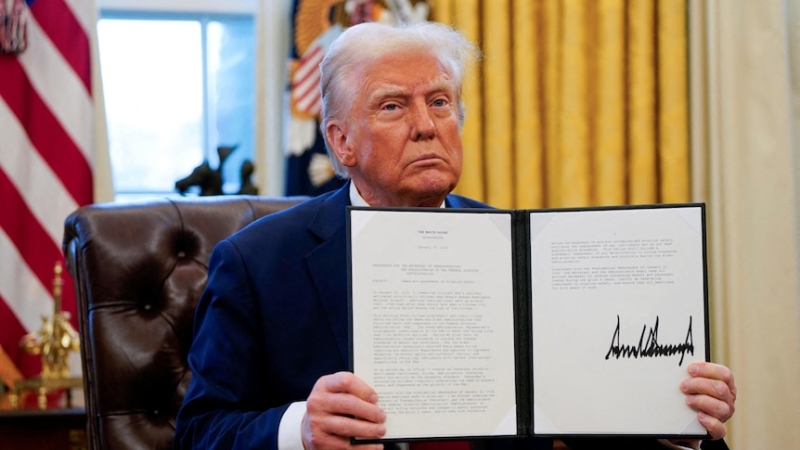In short:
Donald Trump said people in the US will feel "some pain" after he imposed tariffs on trade with Canada, Mexico and China.
The president defended the duties on imports to the US, which will place duties on billions of dollars of trade.
What's next?
Economists and diplomats have signalled hope the trade tariffs will be temporary.
Donald Trump says the tariffs he has imposed on Mexico, Canada and China may cause "some pain" for Americans, as Wall Street and the largest US trading partners signalled hope that the trade war would not last long.
On Sunday, Mr Trump defended the tariffs that he announced the day before.
Canada and Mexico immediately vowed retaliatory measures after the announcement of the president's executive order on Saturday.
Trump imposes tariffs on Canada, Mexico and China
Photo shows Trump looking angry holding a folder with papers that have his signature
The countries said they were working together to face the 25 per cent US duties on imports, which promise to jolt the integrated economies of three North American countries that have had free-trade agreements for decades.
China said it would challenge Mr Trump's 10 per cent tariffs at the World Trade Organization and take unspecified countermeasures.
Critics said that the moves against the three largest US trading partners would hurt Americans by driving prices higher and slowing global growth.
"The USA has major deficits with Canada, Mexico, and China (and almost all countries!), owes 36 Trillion Dollars, and we're not going to be the 'Stupid Country' any longer," the Republican president wrote on social media.
Writing in capital letters, Mr Trump added, "This will be the golden age of America! Will there be some pain? Yes, maybe (and maybe not!)."
Mr Trump did not specify what he meant by "some pain".
Expected stagflation
A model gauging the economic impact of Mr Trump's tariff plan from EY chief economist Greg Daco suggests it would reduce US economic growth by 1.5 percentage points this year, throw Canada and Mexico into recession and usher in "stagflation" — high inflation, stagnant economic growth and elevated unemployment — at home.
Markets were awaiting developments with anxiety, but some analysts said there had been some hope for negotiations, especially with Canada and China.
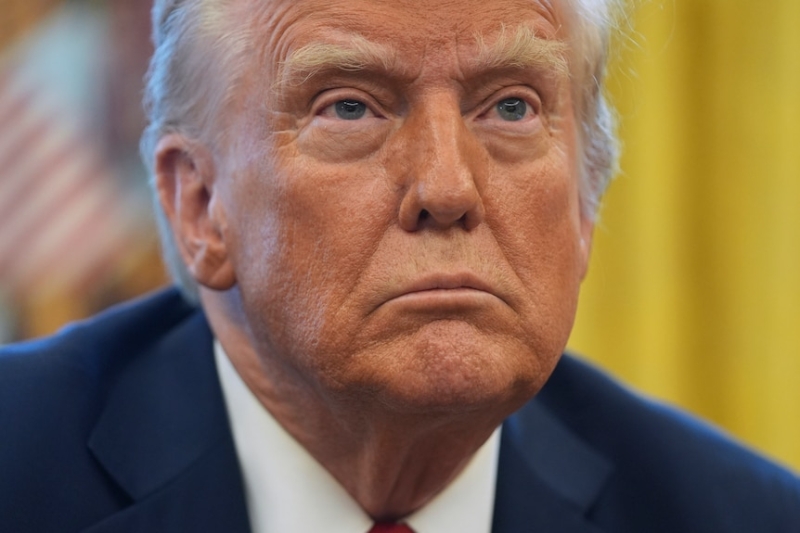
Donald Trump has acknowledged his wide-ranging trade tariffs will cause "pain" for Americans. (AP: Evan Vucci)
"With only two days before implementation, the tariffs look likely to take effect, though a last-minute compromise cannot be completely ruled out," Goldman Sachs economists said in a note Sunday, local time.
They added that since the White House set very general conditions for their removal, the levies are likely to be temporary, "but the outlook is unclear".
The Trump tariffs, outlined in three executive orders, are due to take effect at 12:01am on Tuesday.
Mr Trump vowed to keep them in place until what he described as a national emergency over fentanyl, a deadly opioid, and illegal immigration to the US, ends.
Trump's foreign policy aimed at 'countering China'
Photo shows An image of a worker on a walkie-talkie in foreground blurry with large ship in focus in background.

China left the door open for talks with the US but made a sharp pushback over the drug fentanyl.
"Fentanyl is America's problem," China's foreign ministry said, adding that China has taken extensive measures to combat the problem.
Canada's ambassador to the United States, Kirsten Hillman, on Sunday signalled hope for an agreement.
"We're hopeful that they don't come into effect on Tuesday," Ms Hillman said.
Mr Trump has sounded particularly dismissive toward Canada, with calls for the country to become the 51st US state and saying it "ceases to exist as a viable country" without its "massive subsidy".
National emergency laws
The tariff announcement made good on Mr Trump's repeated threat during the 2024 presidential campaign and since taking office, defying warnings from top economists that a new trade war with the country's top trade partners would erode US and global growth while raising prices for consumers and companies.
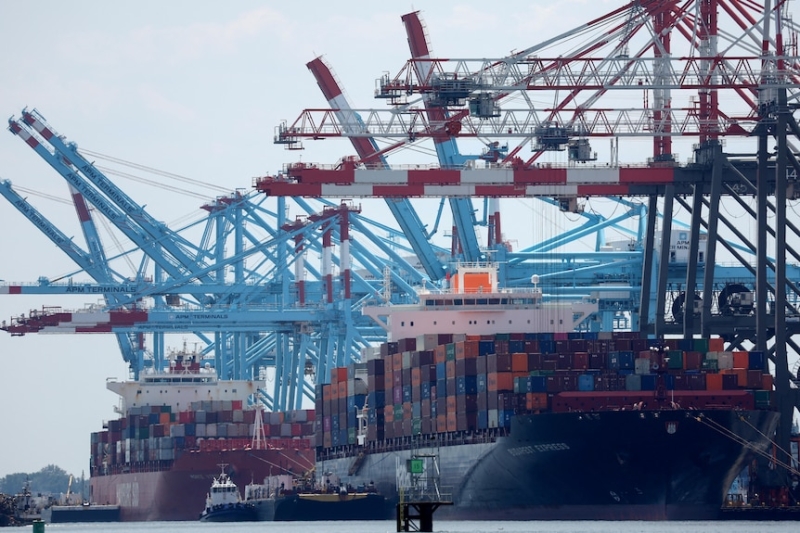
Cargo between the US and Mexico, China and Canada will all be affected by Trump's tariffs. ( SegarekiM :sretueR)
Mr Trump declared a national emergency under laws called the International Emergency Economic Powers Act and the National Emergencies Act to back the tariffs, which give the president sweeping powers to impose sanctions to address crises.
Trade lawyers said Mr Trump was once again testing the limits of US laws, and the tariffs could face legal challenges.
"Who will suffer most? American consumers — who will face skyrocketing prices on everything from groceries to gas to cars," US Representative Josh Gottheimer said.
Canada and Mexico respond
In a message aimed at Americans, Canadian Prime Minister Justin Trudeau said US citizens would be hurt by rising grocery and petrol prices, as well as the possible shuttering of auto assembly plants and limited supplies of metals and minerals.
Mr Trudeau urged Canadians to boycott the US and its goods.
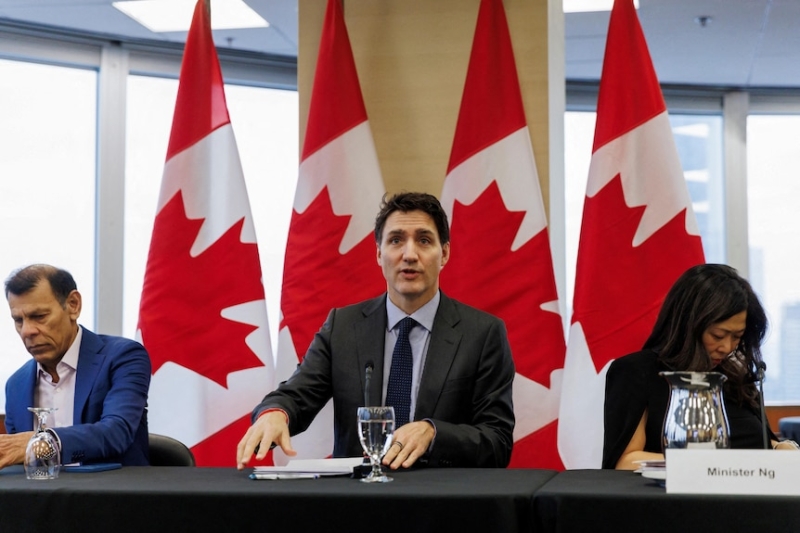
Justin Trudeau said Canada would impose retaliatory tariffs on US goods after Donald Trump's announcement. (Reuters: Cole Burston)
The Canadian leader said on Saturday evening that his country would respond with 25 per cent tariffs against $155 billion of US goods, including beer, wine, lumber and appliances, beginning with $30 billion taking effect on Tuesday and $125 billion 21 days later.
Mexican President Claudia Sheinbaum said on Saturday that she had also ordered retaliatory duties on US exports.
"I've instructed my economy minister to implement the plan B we've been working on, which includes tariff and non-tariff measures in defence of Mexico's interests," Ms Sheinbaum said, without specifying what US goods her government will target.
For decades, the two neighbours have seen cross-border trade grow, including from a highly integrated auto industry, as well as massive volumes of crude oil, natural gas and motor fuels that move in both directions.
Trump turns tragedy into new front in the culture wars
Photo shows Donald Trump stands at the White House briefing room podium, head bowed, eyes closed.
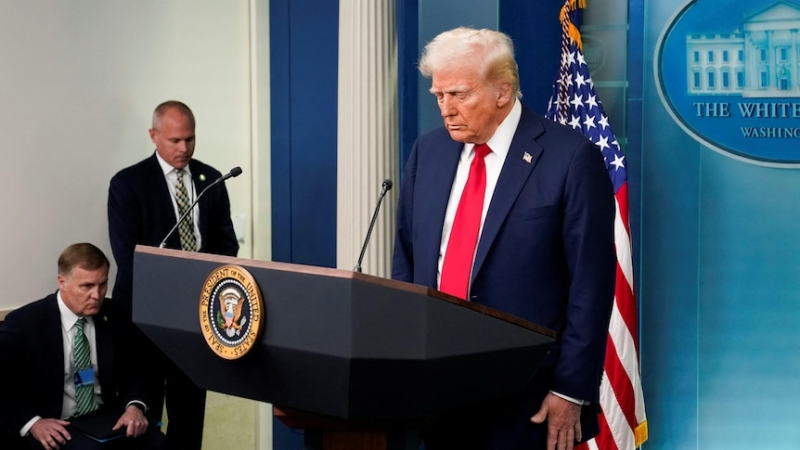
US exports to Mexico accounted for more than $322 billion in 2023, Census Bureau data showed, while the US imported more than $475 billion worth of Mexican products.
There is also a booming farm trade. Mexico sends large volumes of fresh produce north, including avocados and tomatoes, while US farmers supply huge amounts of corn and other grains to Mexican buyers.
A White House fact sheet said the tariffs would stay in place "until the crisis alleviated," but gave no details on what the three countries would need to do to win a reprieve.
US officials said Canada, along with Mexico, has become a conduit for shipments of fentanyl and its precursor chemicals into the US via small packages that are not often inspected by customs agents.
Reuters

